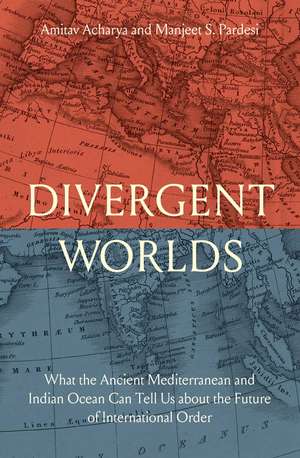Divergent Worlds: What the Ancient Mediterranean and Indian Ocean Can Tell Us About the Future of International Order
Autor Amitav Acharya, Manjeet S. Pardesien Limba Engleză Hardback – 14 ian 2025
In this book Amitav Acharya and Manjeet S. Pardesi compare the interplay of power and ideas in the ancient Mediterranean and Indian Ocean to explain why the two regions took divergent paths to peace and stability. While the ancient Mediterranean order was shaped by the hegemony of Rome, the Indian Ocean developed an open and inclusive international order without the dominance of any single power. Moreover, the Indian Ocean provides a more robust example of the peaceful spread of ideas and culture in contrast to the ancient Mediterranean, where Hellenization, or the spread of Greek ideas, was often accompanied by violence and imperialism.
Applying the divergent experiences of the two regions, the authors argue that the history of the Indian Ocean before European colonization offers a more useful framework for reshaping world order as the U.S.- and Western-dominated Liberal International Order comes to an end. The Indian Ocean framework points to an alternative model of order building—a multiplex rather than a multipolar approach—that could sustain efforts to build peace and stability in the emerging Indo-Pacific region.
Preț: 186.13 lei
Nou
Puncte Express: 279
Preț estimativ în valută:
35.61€ • 37.19$ • 29.41£
35.61€ • 37.19$ • 29.41£
Carte disponibilă
Livrare economică 25 martie-08 aprilie
Livrare express 08-14 martie pentru 29.18 lei
Preluare comenzi: 021 569.72.76
Specificații
ISBN-13: 9780300214987
ISBN-10: 0300214987
Pagini: 248
Ilustrații: 2 b-w illus.
Dimensiuni: 156 x 235 x 26 mm
Greutate: 0.5 kg
Editura: Yale University Press
Colecția Yale University Press
ISBN-10: 0300214987
Pagini: 248
Ilustrații: 2 b-w illus.
Dimensiuni: 156 x 235 x 26 mm
Greutate: 0.5 kg
Editura: Yale University Press
Colecția Yale University Press
Recenzii
“In this brilliantly argued and well-documented book, Acharya and Pardesi convincingly show that multiple world orders can co-exist and that hegemony of a single power is not always needed to maintain them. A must read for scholars and practitioners alike on world orders in their historical and contemporary manifestations.”—T. V. Paul, McGill University
“Divergent Worlds breathes new life into the tired thinking about the classical Mediterranean in international relations. Beyond advancing our understanding of the past, this book also masterfully gets us to think more creatively about the future of current international order. It is a must-read for any IR scholar or student interested in order-making in world politics.”—Ayşe Zarakol, author of Before the West
“A wonderful interdisciplinary study, drawing on the history of Maritime Asia to enrich International Relations analysis—suggesting the possibility of an alternative non-hegemonic order for the post-American world, and stressing the influence of ideas and not merely material power.”—Anthony Milner, Australian National University
“Divergent Worlds breathes new life into the tired thinking about the classical Mediterranean in international relations. Beyond advancing our understanding of the past, this book also masterfully gets us to think more creatively about the future of current international order. It is a must-read for any IR scholar or student interested in order-making in world politics.”—Ayşe Zarakol, author of Before the West
“A wonderful interdisciplinary study, drawing on the history of Maritime Asia to enrich International Relations analysis—suggesting the possibility of an alternative non-hegemonic order for the post-American world, and stressing the influence of ideas and not merely material power.”—Anthony Milner, Australian National University
Notă biografică
Amitav Acharya is the UNESCO Chair in Transnational Challenges and Governance and Distinguished Professor at the School of International Service, American University. Manjeet S. Pardesi is associate professor of international relations in the Political Science and International Relations Programme, and Asia research fellow at the Centre for Strategic Studies at Victoria University of Wellington.
